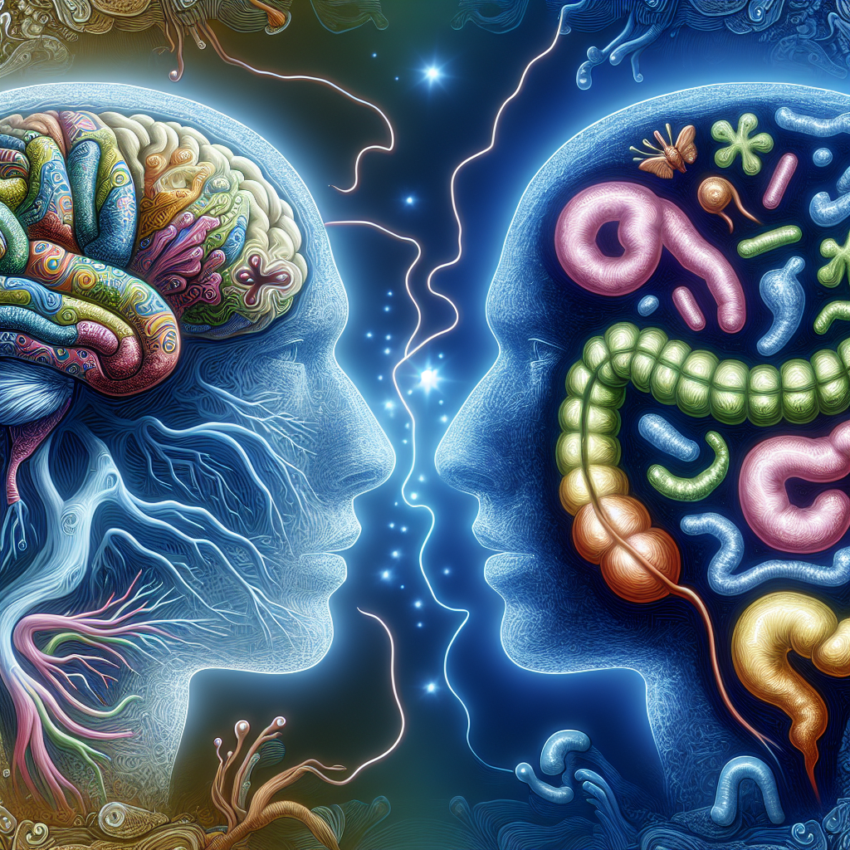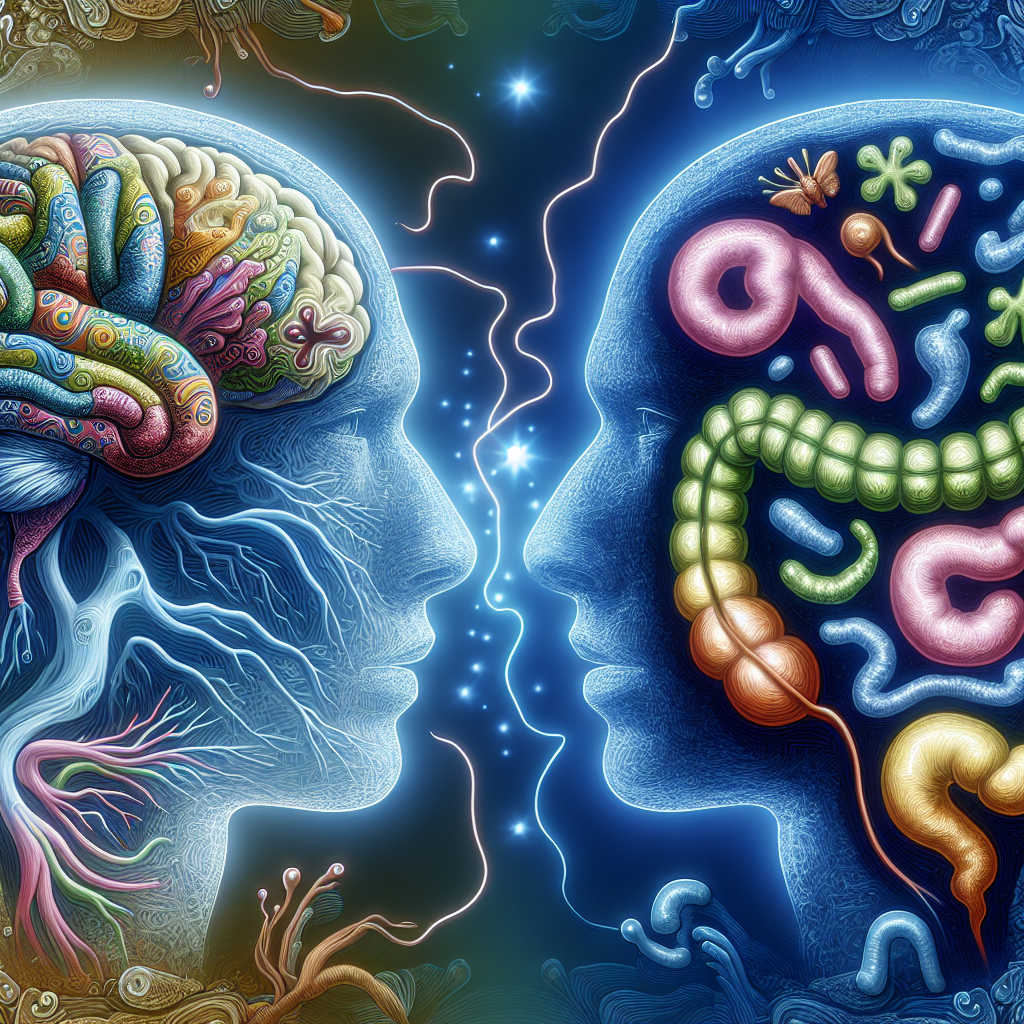The Gut-Brain Connection: How Your Gut Affects Your Mental Health

Have you ever stopped to think about how your gut could be impacting your mental health? It turns out that there is a strong connection between the two. In this article, we will explore the fascinating world of the gut-brain connection and how your gut health can have a significant impact on your mental well-being. So, grab a cup of tea and get ready to learn how taking care of your gut could bring about positive changes in your mental health.
The Gut-Brain Connection
Introduction to the Gut-Brain Connection
Did you know that there is a strong connection between your gut and your brain? It may sound surprising, but the link between these two organs is vital for your overall health and well-being. The gut-brain connection refers to the communication pathway between your gastrointestinal system (the gut) and your central nervous system (the brain). This interaction has a significant impact on various aspects of your mental health. In this comprehensive article, we will explore the gut-brain connection in-depth and understand how it affects your mental well-being.
Understanding the Gut-Brain Connection
Overview of the Gut-Brain Axis
The gut-brain axis forms the foundation of the gut-brain connection. It is a bi-directional communication system that allows constant interaction between the gut and the brain. This axis involves several components, including the central nervous system, the enteric nervous system (ENS) or the “second brain” of the gut, and the vagus nerve. The vagus nerve acts as a vital conduit, facilitating the transmission of signals and information between the gut and the brain. The gut-brain axis plays a critical role in maintaining a delicate balance in the body and ensuring optimal mental health.
The Role of Gut Microbes
Gut microbes, also known as gut microbiota, are the diverse community of microorganisms that reside in your gastrointestinal tract. These microbes include bacteria, viruses, fungi, and other microorganisms. They form a complex ecosystem that has a profound impact on your physical and mental health. The gut microbiota has a symbiotic relationship with your body, aiding in digestion, nutrient absorption, and immune system modulation. Moreover, these microbes produce essential neurotransmitters, such as serotonin, dopamine, and gamma-aminobutyric acid (GABA), which play a crucial role in regulating your mood and emotions.
Communication between the Gut and Brain
The gut and the brain communicate through various pathways, such as neural, immune, and hormonal routes. Neural communication occurs via the vagus nerve, which carries signals bidirectionally between the gut and the brain. This communication pathway allows the gut to send information to the brain about its current state, including nutrient availability, inflammation, and infection. In turn, the brain influences gut function, influencing processes like digestion and motility. Additionally, the gut and the brain communicate through immune cells and chemical messengers, further highlighting the intricate connection between these two organs.

Mental Health Disorders Linked to the Gut-Brain Connection
Depression
Depression is a common mental health disorder that affects millions of people worldwide. Emerging research suggests a strong link between depression and the gut-brain connection. Studies have found that individuals with depression often exhibit imbalances in their gut microbiota composition. These imbalances can lead to alterations in neurotransmitter production and inflammatory responses in the body, thereby contributing to depressive symptoms. Restoring gut microbial diversity through targeted interventions, such as probiotics, has shown promising results in alleviating some symptoms of depression.
Anxiety Disorders
Anxiety disorders encompass a range of conditions characterized by excessive worry, fear, and apprehension. Similar to depression, anxiety disorders have been associated with disruptions in the gut-brain connection. Studies have revealed that individuals with anxiety disorders often have imbalanced gut microbiota, low levels of certain beneficial bacteria, and altered neurotransmitter production. Modulating the gut microbiota through interventions like probiotics or dietary changes may help improve symptoms of anxiety and promote better mental well-being.
Autism Spectrum Disorders
Autism Spectrum Disorders (ASD) are a group of neurodevelopmental conditions that affect social interaction, communication, and behavior. Researchers have discovered a correlation between ASD and abnormalities in the gut-brain connection. Individuals with ASD often exhibit altered gut microbiota composition, increased permeability of the gut barrier, and inflammation in the gastrointestinal system. These gut-related imbalances may contribute to the behavioral and cognitive symptoms associated with ASD. Exploring interventions to restore gut health and microbial balance holds promise for managing ASD symptoms.
Eating Disorders
Eating disorders, such as anorexia nervosa and bulimia nervosa, involve significant disturbances in eating behaviors and attitudes towards food. Recent studies have shed light on the gut-brain connection in the development and maintenance of eating disorders. Gut microbiota imbalances may play a role in the regulation of appetite and satiety signals, as well as mood and reward mechanisms. Addressing gut health as part of the treatment approach for eating disorders may help improve outcomes and support long-term recovery.
Impact of Gut Health on Mental Health
Role of Gut Microbiota in Mental Health
The gut microbiota influences mental health through several mechanisms. These microbes produce essential neurotransmitters like serotonin, which regulates mood, sleep, and appetite. They also modulate the production of other neurotransmitters, including dopamine and GABA, which play roles in reward, motivation, and anxiety regulation. Additionally, the gut microbiota interacts with the immune system and influences inflammation levels. High levels of inflammation have been associated with various mental health disorders, such as depression and anxiety. Therefore, maintaining a healthy and diverse gut microbiota is crucial for optimal mental well-being.
Influence of Diet on Gut Health and Mental Well-being
Diet plays a pivotal role in shaping the gut microbiota and, consequently, mental health. A diet rich in fiber and plant-based foods promotes the growth of beneficial gut bacteria and supports a diverse microbiota. On the other hand, a diet high in processed foods, sugar, and unhealthy fats can negatively impact the gut microbiota, leading to imbalances and inflammation. These imbalances may increase the risk of mental health disorders. Incorporating a healthy and balanced diet consisting of fruits, vegetables, whole grains, and lean proteins can positively influence gut health and promote better mental well-being.
Stress and Gut Health
Stress is a common factor that affects both mental health and gut health. The gut and the brain communicate bidirectionally when faced with stress. When you experience stress, your brain sends signals that can alter gut function, leading to symptoms such as abdominal discomfort, changes in appetite, and disturbed bowel habits. Conversely, gut disturbances, such as imbalanced gut microbiota, can send signals to the brain, contributing to increased stress and anxiety. Managing stress through techniques such as mindfulness, exercise, and self-care can support a healthy gut-brain connection and improve mental resilience.

Factors Affecting the Gut-Brain Connection
Genetics and Gut Health
Genetics play a role in shaping the gut microbiota composition and, consequently, the gut-brain connection. Certain genetic variations can affect the diversity and stability of the gut microbiota, predisposing individuals to mental health disorders. However, it is important to note that while genetics may influence gut health, lifestyle factors and environmental exposures also significantly impact the gut-brain connection. Therefore, focusing on modifiable factors, such as diet and stress management, can have a profound impact on mental health, even in individuals with genetic predispositions.
Early Life Factors and Gut Health
Early life experiences, including prenatal and postnatal factors, can shape the gut-brain connection. Infants born via vaginal delivery are exposed to the mother’s microbiota, which influences their early gut colonization. Breastfeeding further enhances the establishment of a healthy gut microbiota, providing beneficial bacteria and immune-modulating compounds. Additionally, stress during pregnancy and early childhood can impact the gut-brain connection, potentially increasing the risk of mental health disorders later in life. Recognizing the importance of early life factors and implementing strategies to support a healthy gut-brain axis from birth can have long-lasting effects on mental well-being.
Medications and Gut Health
Certain medications, such as antibiotics and proton pump inhibitors (PPIs), can disrupt the gut microbiota and impact the gut-brain connection. Antibiotics, while essential for treating infections, can indiscriminately kill both harmful and beneficial gut bacteria, leading to imbalances in the microbiota. PPIs, commonly used to treat acid reflux, can alter gastric pH and affect the growth of specific bacterial species in the gut. It is essential to use medications judiciously and consider strategies to support gut health during and after their use. Discussing the potential effects of medications with your healthcare provider can help mitigate their impact on the gut-brain connection.
Improving Gut Health for Better Mental Health
Dietary Changes
Implementing dietary changes that promote a healthy gut microbiota can have a significant impact on mental health. Focus on consuming a variety of fiber-rich foods, such as fruits, vegetables, whole grains, legumes, and nuts, as these provide nourishment for beneficial gut bacteria. Additionally, limit processed foods, refined sugars, and unhealthy fats, as they can disrupt the microbiota balance. By adopting a nutrient-rich diet, you can create an environment that supports a diverse and thriving gut microbiota, contributing to better mental well-being.
Probiotics and Prebiotics
Probiotics are live microorganisms that confer health benefits when consumed in adequate amounts. They can help restore and maintain a healthy gut microbiota. Look for probiotic-rich foods or consider taking a high-quality probiotic supplement to introduce beneficial bacteria into your gut. Prebiotics, on the other hand, are specialized plant fibers that serve as nourishment for beneficial gut bacteria. Include prebiotic-rich foods like onions, garlic, asparagus, and bananas in your diet to support the growth of these beneficial bacteria. Probiotics and prebiotics can work synergistically to enhance the gut-brain connection and promote mental well-being.
Reducing Stress
Managing stress is crucial for maintaining a healthy gut-brain connection and promoting mental health. Engage in stress-reducing activities such as mindfulness meditation, yoga, deep breathing exercises, and spending time in nature. Prioritize self-care, establish healthy boundaries, and seek support from loved ones or professionals when needed. By actively managing stress levels, you can positively influence your gut health and support your overall mental well-being.
Exercise and Gut Health
Regular physical exercise not only benefits your physical health but also plays a significant role in optimizing the gut-brain connection. Exercise has been shown to modulate the gut microbiota, increase microbial diversity, and enhance the production of beneficial compounds. Aim for at least 30 minutes of moderate-intensity exercise most days of the week. Engage in activities you enjoy, whether it’s walking, cycling, dancing, or playing a sport. By incorporating exercise into your routine, you can enhance your gut health and promote better mental resilience.
Future Directions in Gut-Brain Connection Research
The Promise of Psychobiotics
Psychobiotics are a new area of research that explores the use of specific bacteria strains or microbial metabolites to improve mental health. These live bacteria or their byproducts can directly impact the gut-brain connection and influence brain function and behavior. Preliminary studies have shown promising results in utilizing psychobiotics to alleviate symptoms of depression, anxiety, and other mental health disorders. The potential of psychobiotics opens up exciting possibilities for targeted interventions that can have a profound impact on mental well-being.
Effects of Gut Health on Neurodegenerative Diseases
Emerging research suggests a link between gut health and neurodegenerative diseases like Alzheimer’s and Parkinson’s disease. Studies have demonstrated that changes in the gut microbiota composition can impact brain health and contribute to the development and progression of these diseases. Exploring the connection between gut health, inflammation, and neurodegeneration holds promise for developing novel prevention and treatment strategies for these debilitating conditions.
Conclusion
The gut-brain connection plays a crucial role in determining the state of your mental health. The interaction between your gut and brain through the gut-brain axis influences various mental health disorders, including depression, anxiety disorders, autism spectrum disorders, and eating disorders. Factors like gut microbiota composition, diet, stress, genetics, early life experiences, and medications can significantly impact the gut-brain connection. By adopting healthy lifestyle practices, such as dietary changes, probiotics, stress management, and regular exercise, you can improve your gut health and promote better mental well-being. Ongoing research and advancements in the field of psychobiotics and the effects of gut health on neurodegenerative diseases hold great promise for the future. Remember, taking care of your gut is not just about digestive health; it’s about nurturing your mental health as well.



Leave a Reply